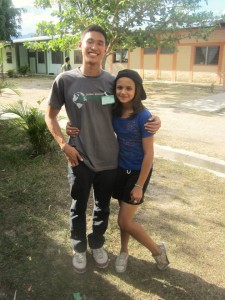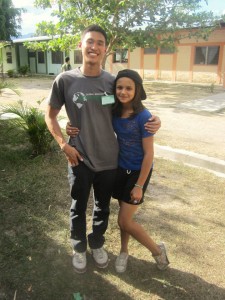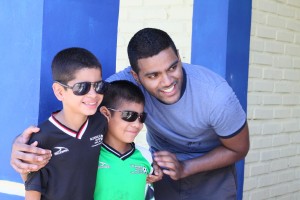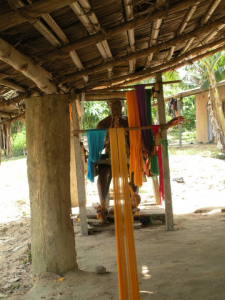Each week we bring you the story and perspective of one of our outstanding Brigaders. This week, meet Jonathan Lew, a Microfinance Brigader from the University of Southern California who recently participated in a Microfinance Brigade in Honduras.
____
To All Future Brigaders:
Expect to learn something–maybe not about finance or business, but about communication, happiness, humanity, and ultimately about yourself.
As a first-time brigader with USC Global Microfinance Brigades (GMFB), I expected to gain some valuable business experience. However, I soon realized that the program goes beyond any such ordinary objectives, providing opportunities to radically change people’s lives. Our group educated local community members on financial planning, but in the end I learned more from community members than I taught them.
Working with Local Community MembersThe Honduran people, although not monetarily wealthy, may be some of the richest people I have ever encountered. Their passion and joy for life is tangible. Their intrinsic warmth transcends any external hospitality that Western society could offer. Not only were the community members open and inviting, but everyone in the program—from the cooks who made us fresh meals daily, to the armed guards who kept us safe—humbly served us as guests in their homeland.
Experience
Sharing educational resources with the Honduran community about topics that have the potential to change their lives is the trip’s greatest reward! At first, it was discouraging to see the local farmers living day-to-day in what seemed like a hopeless cycle of rural poverty. However, we were able to inspire community members with our knowledge of budgeting. Their faces lit up at the thought of investing more for their children’s education. By the end of the week, we had become ambassadors for a better future.
On the other hand, there were times when we doubted our own motives. The Honduran people were so happy already, and seeing their genuine joy for life forced us to question the quality of our own lives. We have more material things than them, but  in the end our wealth is worthless compared to the fulfillment in the little things like family, relationships, and hard work. We were worried that by promoting the idea of amassing wealth, we would take away the simplicity that makes Honduras so beautiful.
in the end our wealth is worthless compared to the fulfillment in the little things like family, relationships, and hard work. We were worried that by promoting the idea of amassing wealth, we would take away the simplicity that makes Honduras so beautiful.
However, I remember one particular woman who reaffirmed our purpose. She was twenty-seven, unmarried and living with her mom at the time. As we questioned her about her finances, she seemed depressed because she had almost no money to invest. When we asked her about her dreams she said that she had none.
But we kept pushing and asked her about her beautiful flower garden, her two pet parrots, even suggested that she start some kind of zoo. All of these conversations seemed to lead to a dead end, but she finally opened up. She did want things. She wanted a car. She wanted to visit America.
Now, we were not selling her a pipedream or a mirage of riches. We just wanted to show her that these things were possible. No, we did not imply that having these “things” would make her happy; rather that she had the option to improve her quality of life. We ended the conversation with a mock invitation to America spoken in broken Spanglish. We all laughed, and even her stone-faced mother joined in.
Throughout the trip, I realized that communication is key in this cross-cultural setting. Not in the sense of saying the right things or using the proper financial vocabulary, but communicating on the human level. Even though I could barely speak Spanish (I should have paid more attention in my high school classes), we connected through the universal languages of music, relationships, laughter, and the idea of something “more.”
These common interests were stronger than any spoken barrier.
In that short week, I made true friends with my Honduran counterparts. It sounds cliché, but our whole group found it quite heart-wrenching to leave such a beautiful place and equally beautiful people. My favorite was our driver, Melvin, whom I discovered was a bigger Eminem fan than I when he started singing the lyrics to “Stan”…in English!
I left out many stories and people in this testimony, but at the heart of my first experience as a brigader is a renewed appreciation for what God has already given me. We provided financial support and consulting services, but the Hondurans shared the infinite wealth of a new perspective on life.
“Appreciate the little things.”
It is such a simple proverb, which makes it just as easy to forget. I guess I needed the people of Honduras to remind me. They live out this motto every day of their lives.
Advice
Come into the program with an open mind and an open heart. Do not be afraid to speak to anyone and everyone, especially the drivers. Despite language barriers, try to make a connection, and they will recognize your effort. There is always common ground to be found.
Here is a poetry piece my friend and I wrote about our Honduras Trip:
Day 7
The trip to Honduras was quite exquisite,
Playing with the orphaned kids was my favorite part of the visit.
It didn’t matter that I didn’t get to bed the night before.
Their energy and happiness was worth more
Than any night’s sleep.
Living the dream
In which the poorest of people
Provide the richest experience of things unseen.
Materialism melted; every one of us felt it.
Warm embraces left radiant faces.
Who knew such small hands could carry so much love?
Or so many cookies.
Though the conditions of their lives weren’t advantageous,
Their enthusiasm for it was contagious,
Infecting all of our hearts.
Like a flesh-eating disease,
Within minutes they just go under our skin,
Despite our hardened hearts they found a way in.
Whatever insecurities we had employed
To guard ourselves with were now destroyed.
Broken walls regardless of spoken barriers.
Laughter became our language.
A pleasure so basic
Yet profound.
The locals taught us what’s truly important in life.
An understanding worth more than any price.
Dollars or dinero are actually worth cero in theory,
But this journey revealed the reality of poverty,
That money isn’t everything,
But it’s the intangibles that make you happy.
Friends, relationships, peace,
A place to call home and people to call family.
An epiphany powerful enough to bring someone to tears.
-Jonathan Lew & Alyssa “Brochacha” Sharpf



